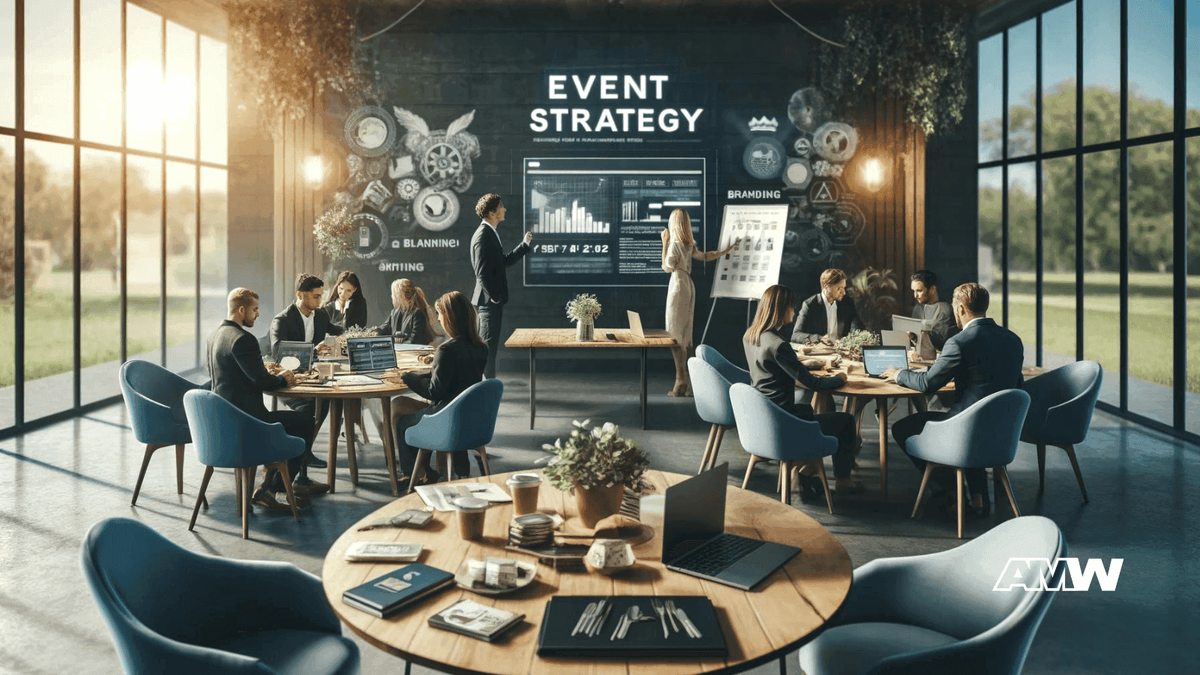Leveraging Event Strategies for Memorable Brand Experiences in 2026

Events are crucial in brand strategy, serving as powerful tools for engaging with target audiences, enhancing brand visibility, and driving customer loyalty. Whether in-person, virtual, or hybrid, a well-executed event can create great experiences that leave a lasting impression on attendees. Event strategies are essential for ensuring these events align with a brand's objectives and deliver measurable results.
Quick Summary
The article emphasizes that events are essential to brand strategy, enhancing visibility and customer loyalty. In 2025, evolving technologies and hybrid formats are crucial for engagement. A precise event strategy defines objectives, audience, messaging, and logistics, ensuring alignment with brand goals. Successful execution incorporates innovation through technology and sustainable practices, with a focus on evaluating performance and enhancing attendee experience for lasting impact.
Event Management in 2025
In 2025, event management continues to evolve rapidly, influenced by technological advancements and changing attendee expectations. Event organizers leverage event tech to enhance attendee engagement, streamline the event registration process, and measure event success more effectively. Hybrid events, which combine in-person and virtual elements, have become more prevalent, offering greater flexibility and reach. Event planners must stay ahead of these trends and incorporate innovative solutions to deliver successful event experiences.
This post aims to provide insights into the fundamentals of event strategy, highlight the importance of strategic event planning, and offer practical guidance for creating a successful event strategy. By understanding key components and best practices, event organizers can develop a comprehensive plan that ensures their events achieve their goals and provide a memorable experience for attendees.
Ready to Grow Your Business?
Get a custom strategy tailored to your goals.
Understanding Events Strategies

What is an Event Strategy?
An event strategy is a detailed plan that outlines an event's objectives, target audience, messaging, logistics, and promotional activities. It is a roadmap for event planners, guiding the planning process from conception to execution and post-event evaluation. The scope of an event strategy encompasses various elements such as event marketing, budget management, attendee engagement, and event technology.
Importance of Aligning Events with Overall Brand Objectives
Aligning events with overall brand objectives ensures they contribute to the organization's broader goals. A successful event strategy involves identifying clear goals that resonate with the brand's mission and values. This alignment helps create a consistent brand message and enhances the event's overall impact on the target audience. Event strategy planning should be integrated with the brand's marketing efforts, utilizing social media platforms and other promotional channels to maximize reach and engagement.
The Role of Event Strategy in Branding

How Events Enhance Brand Visibility and Engagement
Events serve as a central hub for brand interactions, offering opportunities for direct engagement with potential attendees. They provide a platform for showcasing products, sharing brand stories, and fostering community building. Event planners can enhance attendee engagement through fun activities, interactive sessions, and an event app to provide real-time updates and information.
Case Studies of Successful Brand Events
Several brands have leveraged event strategies to achieve remarkable success. For example, a technology company hosted a hybrid event that combined in-person and virtual elements, significantly increasing event attendance and ticket sales. The event's purpose was clearly defined, and the planning involved meticulous attention to event details, effective use of an event platform, and strategic event promotion. This comprehensive plan ensured the event met its objectives and delivered a memorable experience for all attendees.
By following a clear strategy and utilizing the right resources, event teams can create impactful events that meet and exceed their goals. Understanding the key performance indicators and continuously improving events through feedback and event surveys can lead to greater event ROI and long-term success in the events industry.
Components of a Successful Event Strategy

Defining Objectives and Goals
A successful event strategy begins with setting clear, measurable objectives. Event planners must define what they aim to achieve, whether it's increasing brand awareness, generating leads, or boosting ticket sales. These objectives should be Specific, Measurable, Achievable, Relevant, and Time-bound (SMART). Event organizers can focus their efforts and resources more effectively with precise goals.
Aligning event goals with business goals is equally important. The overall event strategy should reflect the organization's broader objectives, ensuring that every event contributes to the company's success. This alignment helps create a coherent brand message and enhances the event's impact on the target audience.
Audience Analysis
Understanding the audience is important in the event strategy planning process. Event planners must gather detailed attendee information, including demographics, preferences, and behaviors. This data helps tailor event experiences to meet potential attendees' needs and interests, leading to higher attendee engagement and event success.
Tailoring event experiences involves customizing various aspects of the event, such as content, activities, and communication. For example, interactive sessions and fun activities can be designed to engage the audience more effectively. Knowing the audience allows event teams to create a more personalized and impactful event experience, whether planning in-person, virtual, or hybrid events.
Crafting the Event Message
A consistent brand message is essential for ensuring the event communicates the desired brand values and objectives. The event's purpose should be articulated and integrated into every aspect of the event, from marketing materials to on-site branding.
Integrating the message throughout the event involves consistently using elements, such as logos, colors, and slogans, across all touchpoints. This consistency helps reinforce the brand's identity and ensures attendees have a cohesive experience. An effective event strategy template can guide this process, ensuring all event details align with the brand message.
Logistics and Planning
Logistics and planning are critical components of a successful event strategy. Venue selection and setup must be handled meticulously to ensure the location meets the event's requirements and enhances the attendee experience. Event organizers should consider accessibility, capacity, and ambiance when choosing a venue.
Technological requirements and innovations in 2025 are also key considerations. Like an event app, event technology can streamline registration, provide real-time updates, and enhance attendee engagement. Incorporating the latest event tech can improve events and ensure they run smoothly.
Marketing and Promotion

Effective event marketing and promotion are crucial for driving attendance and ensuring the event's success. Pre-event marketing strategies should include a mix of online and offline tactics to reach a broad audience. Event organizers should leverage social media platforms, email campaigns, and traditional advertising to build anticipation and encourage registrations.
Harnessing the power of social media for promotion enables event planners to expand their reach and interact directly with attendees, creating a more engaging and impactful experience. Event promotions can include targeted ads, engaging content, and interactive posts to generate buzz around the event. An event website can be the central hub for all event-related information, including the event date, registration details, and promotional materials.
Incorporating these components into the overall event strategy plan helps planners create a comprehensive plan covering all event management aspects. By starting early and utilizing the right resources, event teams can navigate the daunting task of organizing successful events and achieving their goals.
The 5 C's and 5 P's of Event Planning

The 5 C's of Event Planning
Successful event planning involves careful attention to five key elements, known as the 5 C's:
Concept: The Idea Behind the Event
The concept is the foundation of any event strategy. It encompasses the theme, format, and overarching idea that will guide all other aspects of event planning. Event planners must develop a compelling concept that aligns with the event's goals and resonates with the target audience. A strong concept helps in creating a cohesive and engaging event experience.
Coordination: Organizing and Managing Resources
Coordination involves meticulously organizing and managing resources, including personnel, equipment, and materials. Event organizers must ensure that every element is in place and that the event team is on the same page throughout the planning process. Effective coordination is crucial for the smooth execution of the event.
Control: Monitoring Progress and Making Adjustments
Control refers to the ongoing monitoring of the event planning process and the ability to make necessary adjustments. This involves tracking key metrics, managing the event budget, and ensuring all activities align with the overall event strategy. Event planners can address issues and keep the event on track by maintaining control.
Culmination: Execution of the Event
The culmination is the actual execution of the event. It is the point where all planning efforts come together to deliver the event experience. This stage requires precise timing, clear communication, and efficient management to ensure everything runs smoothly. Using event technology, such as an app, can enhance attendee engagement and streamline operations during the event.
Closeout: Post-Event Activities and Feedback
Closeout involves the post-event activities, including collecting feedback, analyzing event data, and evaluating the event's success. Event planners should conduct surveys to gather attendees' information and insights, which can be used to improve future events. This stage also includes finalizing financials, thanking participants, and generating reports on key performance indicators.
The 5 P's of Event Planning
In addition to the 5 C's, event planners should also consider the 5 P's of event planning to ensure a comprehensive approach:
Purpose: The Reason for the Event
The purpose defines the event's goals and objectives. It is essential to clearly understand why the event is being held and what it aims to achieve. This clarity guides the planning process and helps create an effective event strategy template.
People: The Target Audience and Stakeholders
People refer to the attendees, stakeholders, and everyone involved in the event. Understanding the target audience's needs, preferences, and expectations is crucial for designing an engaging event experience. Event organizers should also consider stakeholders' interests, such as sponsors and partners, to meet their objectives.
Place: The Event Location
It is very important to select the right venue for an event. The venue location should be convenient, accessible, and suitable for the event type, whether in-person, virtual, or hybrid. The venue plays an important role in shaping the overall event experience.
Process: The Steps to Execute the Event
The process encompasses the detailed steps and timeline required to execute the event. This includes the planning, coordination, and implementation phases. An effective event strategy planning process involves setting milestones, assigning responsibilities, and ensuring that all tasks are completed on schedule.
Product: The Final Outcome and Experience
The product is the event's outcome, including the attendee experience and the achievement of event goals. Success is measured through event attendance, attendee engagement, and event ROI. By focusing on the desired outcome, event planners can ensure that the event delivers value to the attendees and the organization.
Developing a Strategic Event Plan

Steps to Create a Strategic Event Plan
Creating a strategic event plan is a meticulous process that requires thorough preparation and coordination. Here are the steps to develop a comprehensive event strategy:
Initial Research and Brainstorming
The first step in strategic event planning is conducting initial research and brainstorming. Event planners should gather insights about the target audience, industry trends, and successful event strategies used in similar events. This research helps us understand what works and doesn't, providing a foundation for developing innovative event ideas. Brainstorming sessions with the event team can generate creative concepts and set the direction for the event.
Budgeting and Resource Allocation
Budgeting is vital in event planning. Event organizers need to develop a comprehensive budget that covers both direct and indirect costs associated with the event. This includes venue rental, event technology, marketing, and more expenses. Resource allocation involves assigning the appropriate resources to different tasks, ensuring the event team has everything they need to execute the event successfully. Effective budget management helps avoid overspending and ensures the event stays within financial limits.
Timeline Creation and Milestones
Creating a timeline with clear milestones is essential for tracking and ensuring all tasks are completed on schedule. This timeline should cover every phase of the event planning process, from initial planning to post-event activities. Key milestones include securing the venue, launching the website, opening event registration, and finalizing event promotions. By setting these milestones, event planners can monitor progress and adjust as needed to keep the planning process on track.
Example of a Strategic Event Plan

Let's consider a hypothetical example of a strategic event plan for a tech conference to illustrate the strategic event planning process.
Detailed Breakdown of a Hypothetical Strategic Event Plan
Event Name: Name of the event
Event Date: Date
Event Type: Hybrid Event (In-person and Virtual)
Event Goal: To showcase the latest technological advancements and foster networking opportunities among industry professionals.
Target Audience: Tech enthusiasts, industry experts, investors, and media.
Ready to Grow Your Business?
Get a custom strategy tailored to your goals.
Initial Research and Brainstorming:
- Conduct surveys to understand attendee preferences and interests.
- Research successful tech conferences and identify key elements that contributed to their success.
- Brainstorm with the event team to generate unique ideas and themes for the summit.
Budgeting and Resource Allocation:
- Allocate a budget of$500,000for the entire event.
Allocate a budget of $500,000 for the entire event.
- The breakdown is as follows: $200,000 for venue and logistics, $100,000 for event technology and production, $50,000 for marketing and promotions, $50,000 for speaker fees, $50,000 for catering, and $50,000 for contingency.
- Assign responsibilities and roles to the event team, ensuring each member knows their tasks and deadlines.
Timeline Creation and Milestones:
- January: Finalize event concept and theme.
- February: Secure venue and negotiate contracts.
- March: Launch event website and open event registration.
- April: Begin event promotions on social media platforms.
- June: Confirm speakers and finalize the agenda.
- September: Ramp up marketing efforts, including email and social media ads.
- October: Conduct a dry run to ensure all event tech and logistics are in place.
- November: Perform the event, ensuring all aspects run smoothly.
- Post-Event: Collect feedback through event surveys and analyze event data to measure success and ROI.
Key Elements and Their Implementation
Venue and Logistics:
- Secure a state-of-the-art convention center for in-person events.
- Set up a robust event platform for virtual attendees, integrating an event app for seamless engagement.
Marketing and Promotions:
- Develop a comprehensive event marketing plan that includes ads, social campaigns, and partnerships with tech influencers.
- Use the event website as the central hub for information, registration, and updates.
Attendee Engagement:
- Incorporate interactive sessions, workshops, and networking opportunities to enhance the attendee experience.
- Use event techs such as live polls, Q&A sessions, and virtual meet-ups to keep virtual attendees engaged.
Measurement and Evaluation:
- Define key performance indicators (KPIs) such as attendance, attendee satisfaction, and ticket sales.
- Use event surveys to gather feedback and event data for post-event analysis.
Ready to Grow Your Business?
Get a custom strategy tailored to your goals.
- Measure success based on the achievement of event goals and overall event ROI.
By following this strategic event plan, event organizers can ensure a successful event strategy that meets objectives, engages attendees and delivers a memorable experience.
Best Practices for Memorable Brand Experiences

Innovation and Technology Integration
Incorporating cutting-edge technology is crucial to creating memorable brand experiences. AR/VR and other emerging technologies can transform the attendee experience, making events more immersive and interactive. For example, augmented reality can provide virtual tours of new products, while virtual reality can offer immersive simulations or experiences that transport attendees to different environments.
Enhancing the attendee experience through interactive elements is another key aspect of a successful event strategy. Interactive kiosks, live polling, and real-time Q&A sessions using event apps can significantly increase attendee engagement. Event planners should leverage these technologies to create a dynamic, engaging environment that captivates the audience and encourages active participation.
Sustainability and Ethical Practices

Incorporating sustainable practices in event planning is environmentally responsible and increasingly important to attendees. Event organizers should focus on reducing waste, using eco-friendly materials, and selecting sustainable venues. Implementing digital solutions for event registration and communications can also reduce the event's carbon footprint.
Promoting social responsibility through events can enhance a brand's reputation and foster a positive image. This can be achieved by supporting local communities, partnering with ethical suppliers, and incorporating charitable activities into the event program. By aligning the event's purpose with broader social and environmental goals, brands can create meaningful connections with their audience.
Measuring Success and ROI
Measuring an event's success is essential to understanding its impact and improving future events. Key metrics to evaluate event success include attendance, attendee satisfaction, engagement levels, and the achievement of event goals. Event organizers should define these key performance indicators (KPIs) during the event strategy planning phase.
Tools and methods for tracking and reporting are vital for gathering and analyzing event data. Event technology, such as an event platform or app, can streamline data collection and provide real-time insights. Post-event surveys can capture attendee feedback, while analytics tools can track social media engagement and website traffic.
Event planners should consider both quantitative and qualitative data to measure success effectively. Quantitative data includes metrics like ticket sales, registration numbers, and social media interactions. Qualitative data gathered from attendee surveys, and feedback provides insights into the attendee experience and satisfaction.
By integrating these best practices into their overall event strategy, event organizers can ensure a successful event that leaves a strong impression on attendees. Emphasizing innovation, sustainability, and effective measurement strategies will help brands create memorable experiences that resonate with their audience and achieve their event goals.
Conclusion

Recap of Key Points Discussed
This blog post explored the critical components and best practices for leveraging event strategies to create memorable brand experiences. We started by defining an event strategy and its importance in aligning with overall brand objectives. We then discussed the essential components of a successful event strategy, including defining goals, audience analysis, crafting the event message, logistics and planning, and marketing and promotion.
We also delved into the 5 C's and 5 P's of event planning, which provide a comprehensive framework for event planners to ensure a successful event strategy. Furthermore, we outlined steps to create a strategic event plan, supported by a hypothetical example, to illustrate the practical application of these concepts.
Finally, we highlighted best practices for enhancing attendee engagement through innovation and technology, incorporating sustainability and ethical practices, and effectively measuring success and ROI.
The Future Outlook for Event Strategies in Brand Management
As we look ahead, the future of event strategies in brand management will continue evolving with technological advancements and shifting attendee expectations. Integrating AR/VR, AI, and other emerging technologies will redefine how events are experienced, making them more immersive and interactive. Hybrid events will become more prevalent, offering greater flexibility and reach.
Sustainability will remain a critical focus, with brands increasingly prioritizing eco-friendly practices and social responsibility. Event planners must stay agile, continuously adapting their strategies to meet the industry's demands.
Call to Action for Event Planners and Brand Managers
Event planners and brand managers must embrace these best practices to stay competitive and deliver exceptional event experiences. By leveraging a well-structured event strategy template and focusing on innovation, sustainability, and effective measurement, they can ensure their events achieve the desired outcomes and contribute to overall business success.
As you plan your next event, remember that a clear strategy, thorough planning, and continuous improvement are key to creating memorable brand experiences that resonate with your audience.
FAQ

What is a good event strategy?
A good event strategy is a comprehensive plan that aligns with business objectives, understands the target audience, and effectively uses resources to create engaging and memorable experiences.
What are the event management strategies?
Event management strategies include detailed planning, budgeting, marketing, logistics coordination, and post-event evaluation.
What are the 5 C's of event planning?
The 5 C's of event planning are Concept, Coordination, Control, Culmination, and Closeout.
How do you write an event strategy?
Writing an event strategy involves defining objectives, understanding the audience, developing a consistent message, planning logistics, and creating a marketing plan.
What is the role of event strategy?
The role of event strategy is to ensure that events align with brand goals, effectively engage the audience, and provide measurable outcomes that contribute to overall business success.
What are the components of an event strategy?
Components of an event strategy include objectives and goals, audience analysis, event messaging, logistics planning, marketing, and post-event evaluation.
What should be included in an event strategy?
An event strategy should include a clear purpose, defined goals, target audience insights, detailed logistics plans, a comprehensive marketing strategy, and metrics for success evaluation.
Written by Maria Kanic
Maria Kanic is a Social Media Manager at AMW with expertise in digital campaigns, social media strategy, and brand communications.
Ready to Grow Your Business?
Get a custom strategy tailored to your goals.
Frequently Asked Questions
What are the key elements of a successful event strategy for 2026?
A successful event strategy for 2026 includes five critical components: defining SMART objectives aligned with business goals, conducting thorough audience analysis to understand attendee demographics and preferences, crafting consistent brand messaging throughout the event, managing logistics including venue selection and event technology integration, and implementing comprehensive marketing strategies across multiple channels. These elements work together to create memorable brand experiences that drive engagement and deliver measurable results.
How do hybrid events enhance brand visibility and engagement in 2026?
Hybrid events in 2026 combine in-person and virtual elements to maximize reach and flexibility. They enhance brand visibility by expanding audience capacity beyond physical venue limitations, allowing global participation through virtual platforms. Engagement is boosted through interactive sessions, event apps providing real-time updates, and multiple touchpoints for attendee participation. This format increases ticket sales, improves event ROI, and creates more inclusive experiences that cater to diverse attendee preferences.
What role does event technology play in modern event management strategies?
Event technology is crucial for streamlining event management processes in 2026. Key technologies include event apps for real-time communication and updates, advanced registration platforms to simplify attendee sign-up, engagement tools for interactive sessions, and analytics software for measuring event success. These innovations help event organizers enhance attendee experiences, gather valuable data through event surveys, automate logistics, and improve overall event ROI while reducing manual planning burdens.
How should brands align event objectives with overall business goals?
Event objectives should directly support broader business goals through strategic alignment. Start by identifying specific business outcomes like lead generation, brand awareness, or customer retention. Then create SMART event goals that contribute to these objectives, such as generating a specific number of qualified leads or achieving target engagement metrics. Integrate event messaging with brand values and ensure all event elements from content to activities reinforce the company's mission and marketing strategy.
What are the most effective event marketing strategies for 2026?
Effective event marketing in 2026 combines digital and traditional channels for maximum reach. Key strategies include leveraging social media platforms with targeted ads and engaging content, creating dedicated event websites as information hubs, implementing email campaigns for different attendee segments, and using influencer partnerships for credibility. Start marketing early with teaser campaigns, provide clear value propositions, and maintain consistent messaging across all promotional materials to drive registrations and build event anticipation.
How can event planners measure event success and ROI effectively?
Measuring event success requires establishing clear key performance indicators (KPIs) aligned with event objectives. Track quantitative metrics like attendance rates, engagement levels, lead generation numbers, and revenue generated. Use qualitative measures through post-event surveys and attendee feedback to assess experience quality. Implement event technology for real-time analytics, social media monitoring for brand sentiment, and follow-up campaigns to measure long-term impact on customer relationships and business outcomes.
What audience analysis techniques should be used for event strategy planning?
Effective audience analysis involves gathering comprehensive attendee data including demographics, professional backgrounds, preferences, and past event behaviors. Use registration surveys, social media insights, customer databases, and industry research to build detailed attendee personas. Analyze preferred communication channels, content interests, and engagement patterns to tailor event experiences. This data helps customize event content, select appropriate venues, choose relevant speakers, and design interactive activities that resonate with your target audience's specific needs and expectations.
Related Resources
Calculators
Pricing Guides
Key Terms
Marketing strategy that promotes brands, products, or services through hosted or sponsored in-person or virtual events.
Attendee AcquisitionThe marketing strategies and tactics used to attract and convert target audiences into event registrants.
Event Experience DesignHolistic approach to creating memorable, purposeful attendee journeys at events.
Attendee Acquisition StrategyPlanned approach to attracting and registering target audiences for events.
Post-Event StrategyPlanned follow-up activities that extend event value and drive business outcomes.
Related Articles

How to Leverage Technology for Effective Hybrid Events
Hybrid events combine in-person and virtual elements, addressing diverse attendee needs. By leveraging technology, event organizers can enhance engagement, expand reach, and deliver value....

Mastering Corporate Event Marketing for Maximum Business Impact
Corporate event marketing has evolved into a sophisticated strategy that transforms business gatherings into powerful brand experiences. Companies now recognize that well-executed events create deeper

Elevate Your Events in 2026: The Ultimate Event Strategy Guide
As we embrace 2025, the events industry thrives on innovation and adaptability. In this era, the role of an event organizer transcends traditional boundaries, morphing into a blend of artistry and ana